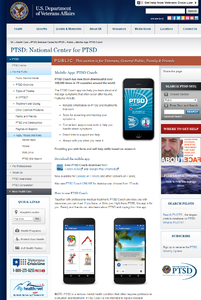PTSD Coach

- Description:
PTSD Coach is a mobile application designed to help individuals manage symptoms of post-traumatic stress disorder (PTSD), either as a stand-alone tool or alongside face-to-face therapy. It was developed for military veterans but is freely available for download for both iPhones and Android phones. A desktop version called PTSD Coach Online is also available. The program includes four main sections. The ‘Learn’ section provides you with information about PTSD and treatment options. You can complete the PTSD checklist in the ‘Self-Assessment’ section and receive personalised feedback. In the ‘Manage Symptoms’ section you can rate your distress level in relation to a variety of symptoms and are introduced to tools for managing these symptoms (eg relaxation exercises, positive imagery). Finally, ‘Find Support’ provides details of various support services (targeted at veterans and service members). PTSD Coach Australia has been adapted from US version for Australian veterans. No further evidence for Australian version is available.
- Service URL:
- https://www.ptsd.va.gov/public/materials/apps/PTSDCoach.asp
- Agency Responsible:
- US Department of Veterans Affairs (VA).
- Mobile Platforms:
- Apple and Android.
Details
- Format:
- Smartphone Application.
- Intervention Types:
- Educational (primarily educational material or psychoeducation), Psychological – CBT and Stress management including relaxation.
- Course Structure:
- Structured Course.
- Course Length:
- Moderate (2-5 modules). 'Learn', 'Self Assessment', 'Manage Symptoms' and 'Find Support' screens
- Support Option:
- Automated only.
Target Audience
- Primary Category:
- Post traumatic stress disorder.
- Target Audience:
- Adult. Veterans
- Language:
- English.
Access
- Mobile platforms:
- Fee:
- Free.
- Access:
- Open: No registration required.
- Contact Details:
ncptsd@va.gov
Research evidence
- Research Trials:
- 4
- Research RCTs:
- 2
- Outcome Summary:
PTSD Coach has been evaluated in 2 randomised controlled trials and 2 other research studies.
In a randomised controlled trial (RCT) of 120 community participants exposed to a recent trauma and having PTSD symptoms, PTSD Coach was compared to a waitlist control over a three month period. At post-treatment, participants using PTSD Coach showed greater improvements in PTSD symptoms, depression, and psychosocial functioning relative to controls (d=.41, .45, .51 respectively), but no effect for PTSD coping self-efficacy. (1)
One pilot RCT of 49 adult trauma survivors with PTSD symptoms in the general community compared PTSD Coach with a waitlist control over a one month period. Participants using PTSD Coach did not show significant improvements relative to the waitlist control group. PTSD Coach participants did show reductions in symptoms between pre- and post-treatment (2)
One research trial of 20 military veterans with PTSD symptoms compared 2 different approaches for PTSD Coach: self-managed PTSD Coach (SM) and clinican-supported PTSD Coach (CS). Compared to baseline, participants in both conditions showed a significant reduction in PTSD symptoms at post-treatment (SM: d = 0.02, p<.05; CS: d=1.4, p<.01). Participants receiving clinical support were more likely to engage with mental health services (φ=.66). No control group was utilised. (3) See also (4) for development.
A preliminary research study of 45 veterans in treatment for PTSD on the acceptability and perceived helpfulness of PTSD Coach showed that participants found PTSD Coach both acceptable and helpful in managing PTSD symptoms over a period of three days. However, there were no measures of actual health benefits. (5)
Overall, there is some initial evidence that PTSD Coach may have health benefits for people in the community with PTSD symptoms.
- Recommended rating, reviewer 1:

- Recommended rating, reviewer 2:

Read more about Beacon's Smiley Rating System.
Research paper citations
(1) Kuhn, E., Kanuri, N., Hoffman, J. E., Garvert, D. W., Ruzek, J. I., & Taylor, C. B. (2017). A randomized controlled trial of a smartphone app for posttraumatic stress disorder symptoms. Journal of Consulting and Clinical Psychology, 85(3), 267–273. doi:10.1037/ccp0000163
(2) Miner, A., Kuhn, E., Hoffman, J. E., Owen, J. E., Ruzek, J. I., & Taylor, C. B. (2016). Feasibility, acceptability, and potential efficacy of the PTSD Coach app: A pilot randomized controlled trial with community trauma survivors. Psychological Trauma: Theory, Research, Practice, and Policy, 8(3), 384–392. doi:10.1037/tra0000092
(3) Possemato, K., Kuhn, E., Johnson, E., Hoffman, J. E., Owen, J. E., Kanuri, N., … Brooks, E. (2016). Using PTSD Coach in primary care with and without clinician support: a pilot randomized controlled trial. General Hospital Psychiatry, 38, 94–98. doi:10.1016/j.genhosppsych.2015.09.005
(4) Possemato, K., Kuhn, E., Johnson, E. M., Hoffman, J. E., & Brooks, E. (2016). Development and refinement of a clinician intervention to facilitate primary care patient use of the PTSD Coach app. Translational Behavioral Medicine, 7(1), 116–126. doi:10.1007/s13142-016-0393-9
(5) Kuhn, E., Greene, C., Hoffman, J., Nguyen, T., Wald, L., Schmidt, J., ... & Ruzek, J. (2014). Preliminary evaluation of PTSD Coach, a smartphone app for post-traumatic stress symptoms. Military medicine, 179(1), 12-18.
User ratings
User ratings and comments are moderated in order to assure the quality of the submissions. It might take a week for your rating to show up.
Your rating
Login to rate this service.
Other user ratings
Last Updated: June 7th 2018

 Home
Home
 Categories
Categories Post traumatic stress disorder
Post traumatic stress disorder